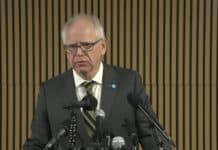
In a lawsuit filed in federal court, a white Minnesota farmer is suing Gov. Tim Walz and the commissioner of the Minnesota Department of Agriculture (MDA) for racial discrimination.
On July 20, 2023, Lance Nistler applied for the Minnesota Department of Agriculture’s “Down Payment Assistance Grant” program. This program awards qualified farmers with up to $15,000 in grant funding to help them purchase their first farm. Among the requirements, applicants must be Minnesota residents who intend to farm the land they purchase for a minimum of five years and who have never owned a farm before.
However, Democratic Gov. Tim Walz and Democratic majorities in the Minnesota Legislature authorized a new preference system last year which changes how grant funding is awarded under the program.
Passed during the 2023 session, SF 1955 directs MDA to prioritize “emerging farmers” when awarding grant funding for the Down Payment Assistance Grant program.
“Emerging farmers” are defined as farmers, or aspiring farmers, who are “women, veterans, persons with disabilities, American Indian or Alaskan Natives, members of a community of color, young, lesbian, gay, bisexual, transgender, queer, intersex, or asexual (LGBTQIA+), or urban, and any other emerging farmers as determined by the commissioner.”
According to the lawsuit, SF 1955 “significantly changed how the funds would be awarded. Instead of awarding funds on a first-come, first-serve basis, the bill requires the MDA to prioritize ’emerging farmers.'”
Nistler, a white man, applied to the Down Payment Assistance Grant program after the new preference system was signed into law.
Amazingly, Nistler’s application was drawn ninth in the state lottery that awards these grants to farmers. However, once the state’s racial, gender, and sexual preferences were applied to the lottery drawing, Nistler’s application was moved to 102nd on the waitlist, the lawsuit says.
According to the lawsuit, only 68 applicants received grant funding from the State of Minnesota; Nistler was not one of them. Based on his lottery drawing, Nistler would have received a grant if he was either a woman or part of a “community of color,” the lawsuit claims.
“Despite Nistler being the model individual the state ought to be assisting with farm ownership, and despite being one of the first applications picked in the lottery, he lacked the state’s preferred skin color and sex. His application was pushed to the back of the line, solely because of his race and sex,” the lawsuit says.
Nistler lives in northern Minnesota and has farmed since he was a boy. He hopes to “one day have his own farm near his home.”
Despite the state’s preference for farmers who are black, brown, sexual minorities, and other categories, over 99% of farmers in Minnesota are white, according to the U.S. Department of Agriculture’s most recent available census from 2017. Additionally, the same census showed that 69% of Minnesota farmers are men.
Nistler is being represented by the Pacific Legal Foundation (PLF) and the Upper Midwest Law Center (UMLC) in his case.
In a statement on the lawsuit, PLF attorney Andrew Quinio said, “Minnesota believes Lance Nistler is less deserving of a farm because he has the wrong skin color and sex. It is unfair for the government to advantage or disadvantage anyone for benefits based on immutable characteristics like race and sex.”
James Dickey, senior counsel with UMLC, said, “We stand with the Pacific Legal Foundation and Lance Nistler against race and sex discrimination in Minnesota’s farming grants. No one should face obstacles in realizing their dreams based on their race or sex.”
Nistler’s lawsuit is asking the federal court to declare unconstitutional Minnesota’s preference for minorities and women within the grant program. Furthermore, he asks that the court prevent Gov. Walz and MDA Commissioner Thom Petersen from “discriminating on the basis of race and sex in the awarding and administering” of these grants.
In addition to asking the defendants to pay attorneys’ fees, Nistler is seeking only $1 in damages.
According to the lawsuit, Nistler intends to reapply for the grant program in 2024.










